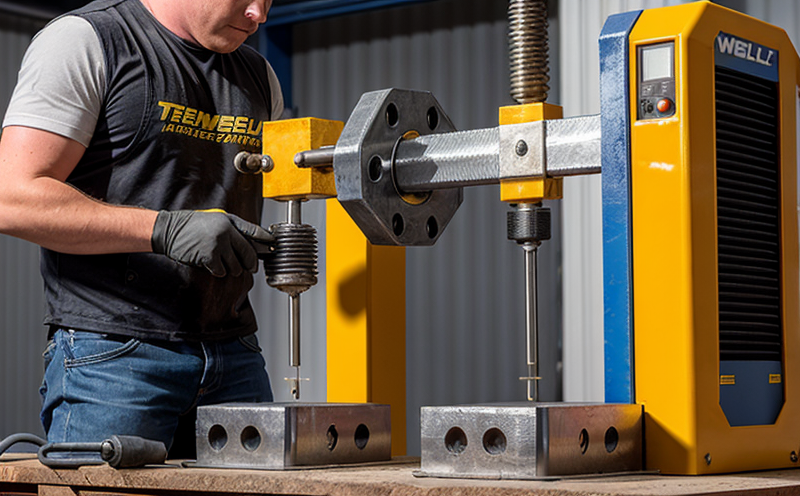Weld strength testing under tensile loading
Unveiling the Strength of Your Welds The Importance of Tensile Loading Testing
In the world of engineering and manufacturing, weld strength is a critical factor that determines the safety and reliability of your products. A weak weld can lead to catastrophic failures, resulting in costly downtime, damaged equipment, and even loss of life. Thats why its essential for businesses to have their welds tested under tensile loading a laboratory service provided by Eurolab.
Tensile loading testing evaluates the strength of a weld by subjecting it to increasing forces until it fails. This type of test is crucial in ensuring that your welds can withstand the stresses and strains of everyday use, harsh environments, and extreme conditions. In this article, well delve into the benefits of using tensile loading testing, explore its importance in various industries, and answer frequently asked questions about this laboratory service.
Why Weld Strength Testing under Tensile Loading is a Must
Tensile loading testing is an essential tool for businesses to ensure their products meet the required standards of strength and durability. Here are some compelling reasons why you should consider investing in this laboratory service
Ensure product safety Weak welds can lead to catastrophic failures, resulting in damage to people, property, and equipment. Tensile loading testing helps identify potential weaknesses, allowing you to take corrective action before its too late.
Compliance with industry standards Many industries, such as aerospace, automotive, and construction, have strict regulations regarding weld strength. Tensile loading testing ensures your products meet these standards, reducing the risk of non-compliance and associated fines.
Reduce warranty claims and liabilities By identifying weak welds early on, you can minimize the number of warranty claims and reduce your liability exposure. This not only saves you money but also protects your reputation in the market.
Improve product reliability Tensile loading testing helps identify areas for improvement in your welding processes, allowing you to optimize and refine your techniques to produce stronger, more reliable welds.
Key Benefits of Weld Strength Testing under Tensile Loading
Here are some of the key benefits of using tensile loading testing
Improved product quality By identifying weak welds early on, you can improve your products overall quality, reducing the risk of defects and failures.
Increased customer satisfaction When your products meet or exceed industry standards, customers are more likely to be satisfied with their purchase, leading to increased loyalty and repeat business.
Reduced costs By minimizing warranty claims and liability exposure, you can save money on repairs, replacements, and legal fees.
Competitive advantage Companies that invest in tensile loading testing demonstrate a commitment to quality and safety, setting them apart from competitors and establishing a reputation for excellence.
Applications of Weld Strength Testing under Tensile Loading
Tensile loading testing has numerous applications across various industries
Aerospace Ensure the strength and durability of aircraft components, including fasteners, bolts, and welds.
Automotive Test the strength of vehicle components, such as engine mounts, suspension parts, and body panels.
Construction Verify the strength of building materials, like steel beams, concrete foundations, and welds.
Energy Assess the integrity of power plant equipment, including pipes, valves, and heat exchangers.
QA Weld Strength Testing under Tensile Loading
Here are some frequently asked questions about tensile loading testing
What is tensile loading testing?
Tensile loading testing evaluates the strength of a weld by subjecting it to increasing forces until it fails.
Why do I need to test my welds?
Tensile loading testing ensures your products meet industry standards, reduces warranty claims and liabilities, and improves product reliability.
What types of materials can be tested using tensile loading testing?
Any material that requires welds, including metals, alloys, and composites.
How long does a tensile loading test take?
The duration of the test depends on the type of material being tested, but it typically ranges from 30 minutes to several hours.
What is the cost of tensile loading testing?
The cost varies depending on the scope of the project, the type of materials being tested, and the complexity of the welds.
Conclusion
In conclusion, weld strength testing under tensile loading is a critical laboratory service that ensures your products meet industry standards, reduces warranty claims and liabilities, and improves product reliability. By investing in this service, you can establish a reputation for excellence, improve customer satisfaction, and reduce costs. At Eurolab, we offer comprehensive tensile loading testing services to help businesses like yours achieve their goals. Dont compromise on weld strength choose the best.




